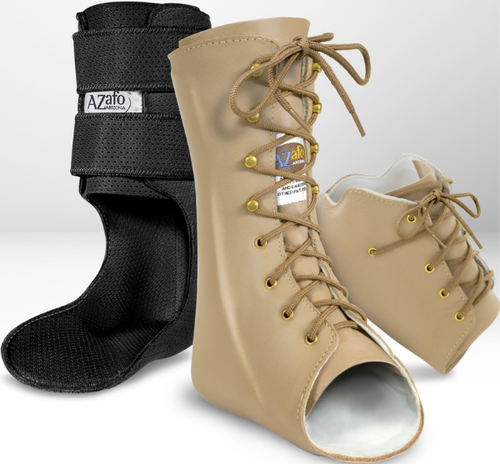Diabetic Foot Treatment
If you’ve been diagnosed with diabetes, you’ll know the condition requires close management. As well as checking your blood sugar regularly and maintaining a healthy diet, you must look out for early signs of complications to prevent the development of debilitating health issues. Surprisingly, foot problems represent one of the most common diabetes symptoms and can lead to damaging consequences, including amputation.
As such, you must work with our foot care specialists to create a diabetic foot care plan to keep you fit and mobile for the foreseeable future.
How Diabetes Damages the Feet
The two primary factors that contribute to diabetic foot complications include:
- Poor circulation: High blood sugar levels cause chronic inflammation that can reduce blood circulation to the legs and feet. In the long term, reduced circulation will deprive your feet of the oxygen and nutrients they need to fight infections and repair wounds.
- Peripheral neuropathy: Around half of people with diabetes have some form of nerve damage, which often affects the feet and legs. Also known as peripheral neuropathy, this problem can cause pain, tingling, and numbness.
When people with poor circulation and nerve damage experience a foot injury, they may not feel any pain. As such, they may not notice the problem. With the body less able to heal, even minor injuries such as blisters, ingrown toenails, and cuts could lead to serious infection. Around 130,000 Americans with diabetes have amputations annually, a figure we could significantly reduce by adopting preventative diabetic foot care across the country.
So, what should you do if you notice a wound on your feet? Seek immediate care at a podiatry clinic such as Fixing Feet Institute. Our podiatrists will be able to deliver the proper wound care you require, including:
- Debridement: We’ll thoroughly clean the wound to prevent infection or other complications.
- Medication and dressing: We’ll treat the wound with medications (if required) and apply dressing to prevent infection. We may also use laser therapy or other advanced treatments to promote healing.
- Offloading: You’ll need to avoid putting pressure on your foot as it heals. If necessary, we’ll advise you about using crutches, walking boots, or a wheelchair.
- Follow-up appointments: We’ll schedule follow-up appointments to ensure your wound is healing well.

Common Foot Problems For People With Diabetes
Diabetics can suffer from a variety of common foot problems, but the difference is that for them, those foot problems can turn into serious issues. Common foot conditions can become more problematic because of two issues that are known to affect diabetic feet.
- Diabetic neuropathy. If you do not have control over your diabetes and you have too much glucose in your blood for an extended period of time, nerve damage is highly possible. If you damage the nerves in your feet and legs, you're not going to feel much of anything. Some people think it would be nice not to feel pain, but when you don't feel pain, you don't know when you're hurt. Too many diabetics will injure their feet, whether it's by wearing ill-fitting shoes or cutting their feet while they walk around barefoot. Unfortunately, they have no idea that they hurt themselves and if it goes unnoticed for too long, the wound can become infected. Serious infections or tissue death may beyond medical repair, requiring amputation to save the patient’s life.
- Peripheral vascular disease. This is a circulation disorder that affects blood vessels away from the heart; its signature is poor circulation in the arms and legs. Fatty deposits build up in the inner linings of the artery walls of the legs and hinder blood flow. When diabetics have poor blood flow, any wounds or injuries they have on their feet will have trouble healing. Even when a person finds the injury quickly and takes the appropriate steps to have it treated, the process can be very slow.
Following these steps will significantly reduce your chances of amputation and help you maintain an active lifestyle.
Developing Your Diabetic Foot Care Plan
Maintaining healthy feet doesn’t have to be rocket science. At Fixing Feet Institute, we’ll work with you to prevent complications by creating an easy-to-follow care plan. This plan is likely to include:
- Regular checkups: We recommend you book a diabetic foot checkup at least once a year to test for early signs of neuropathy and circulation problems. Catching problems early will ensure they don’t escalate into serious health issues.
- Checking your own feet: Conducting a daily foot check is quick, easy, and represents one of the best ways to prevent diabetic foot complications. If you notice anything out of the ordinary, you should schedule an appointment as soon as possible.
- Protect your feet: We recommend wearing socks and shoes at all times to reduce your risk of a foot injury. Take it a step further and wear diabetic shoes, which are made specifically to protect the feet against diabetic wounds like foot ulcers. This type of shoe also has extra depth built in them to allow for diabetic inserts and orthotics. Wearing diabetic shoe inserts or orthotics also adds a layer of protection and support for your feet.
- Manage your diabetes: Keeping your blood sugar in check will help prevent a vast range of complications, including diabetic neuropathy. We advise all patients to work with a metabolic specialist to keep their diabetes under control.
- Get Vascular testing: this simple procedure is recommended to get done as soon as possible so that you can have a baseline to compare to as you get older.
- Seek professional help if you notice a problem: If you notice a persistent blister or ingrown toenail, don’t hesitate to contact our office. We’ll do everything we can to prevent further complications and help you get back on your feet.

.png)










